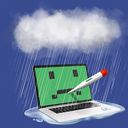Sick days ushered into confusing new era

Employees, parents and students are trying to figure out the new norms for taking a sick day.
Why it matters: Schools and businesses largely erred on the side of caution at the height of the pandemic, but expectations are now shifting — in ways that can be difficult to predict.
State of play: Fully remote work raised the bar for how sick you should be to take time off. Because employees were already at home, they often kept working through mild symptoms.
- But return-to-office rates are at the highest point in almost four years — while respiratory illnesses are also at above-average levels, the Wall Street Journal reported.
- That's creating tensions between employees accustomed to working through illness and coworkers who don't want to get sick.
What they're saying: Changing norms and the threat of layoffs together might push some workers to forego sick days they really should take, Dan Schawbel, a managing partner of Workplace Intelligence, a research agency, told Axios.
- Ideally, people within companies should lead by example, he said.
- "When executives say, 'Hey, I'm sick and going to take the day off,' that signals to people who work for them that it's OK for them to take time off if they're sick," Schawbel said.
In school, students were told for a long time not to come to class if they thought they might be sick. But as schools struggle to overcome pandemic-era learning loss, those rules are changing, too.
- Chronic absenteeism has spiked, and misconceptions around school sickness policies contribute to chronic absenteeism, per Attendance Works, a nonprofit research initiative.
- "Families are really unclear about when to keep their kids home and when to send them to school," Hedy Chang, the founder and executive director of Attendance Works, told Axios last year.
- Staying home when sick became the standard during the pandemic. More recently, schools have set varying guidance on when to keep children home, leaving parents confused, the AP reported.
Zoom out: The U.S. is an outlier among rich countries in not having national paid sick leave policies.
- The share of low-wage workers with paid sick leave has surged since 2010, but remains low. Among high-wage groups, a large majority of workers have access to paid sick time.
The bottom line: "If we care about our employees and we care about our students and their health, then they shouldn't be showing up sick," Kathleen Quinn Votaw, a recruiting and retention expert, told Axios.
- "And we, as either business leaders or academic leaders, need to find a way to close that gap when someone has to decide for their health and others to stay home."
Go deeper: More workers now get sick days